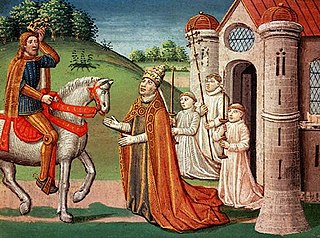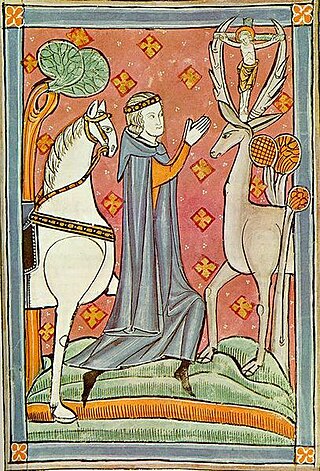The 780s decade ran from January 1, 780, to December 31, 789.
The 770s decade ran from January 1, 770, to December 31, 779.

Year 742 (DCCXLII) was a common year starting on Monday of the Julian calendar, the 742nd year of the Common Era (CE) and Anno Domini (AD) designations, the 742nd year of the 1st millennium, the 42nd year of the 8th century, and the 3rd year of the 740s decade. The denomination 742 for this year has been used since the early medieval period, when the Anno Domini calendar era became the prevalent method in Europe for naming years.

Year 754 (DCCLIV) was a common year starting on Tuesday of the Julian calendar, the 754th year of the Common Era (CE) and Anno Domini (AD) designations, the 754th year of the 1st millennium, the 54th year of the 8th century, and the 5th year of the 750s decade. The denomination 754 for this year has been used since the early medieval period, when the Anno Domini calendar era became the prevalent method in Europe for naming years.

Year 772 (DCCLXXII) was a leap year starting on Wednesday of the Julian calendar. The denomination 772 for this year has been used since the early medieval period, when the Anno Domini calendar era became the prevalent method in Europe for naming years.

Year 758 (DCCLVIII) was a common year starting on Sunday of the Julian calendar. The denomination 758 for this year has been used since the early medieval period, when the Anno Domini calendar era became the prevalent method in Europe for naming years.

Year 776 (DCCLXXVI) was a leap year starting on Monday of the Julian calendar. The denomination 776 for this year has been used since the early medieval period, when the Anno Domini calendar era became the prevalent method in Europe for naming years.

Year 778 (DCCLXXVIII) was a common year starting on Thursday of the Julian calendar, the 778th year of the Common Era (CE) and Anno Domini (AD) designations, the 778th year of the 1st millennium, the 78th year of the 8th century, and the 9th year of the 770s decade. The denomination 778 for this year has been used since the early medieval period, when the Anno Domini calendar era became the prevalent method in Europe for naming years.

Year 782 (DCCLXXXII) was a common year starting on Tuesday of the Julian calendar, the 782nd year of the Common Era (CE) and Anno Domini (AD) designations, the 782nd year of the 1st millennium, the 82nd year of the 8th century, and the 3rd year of the 780s decade. The denomination 782 for this year has been used since the early medieval period, when the Anno Domini calendar era became the prevalent method in Europe for naming years.

Year 785 (DCCLXXXV) was a common year starting on Saturday of the Julian calendar. The article denomination 785 for this year has been used since the early medieval period, when the Anno Domini calendar era became the prevalent method in Europe for naming years. It is still used today in this manner.

Year 788 (DCCLXXXVIII) was a leap year starting on Tuesday of the Julian calendar, the 788th year of the Common Era (CE) and Anno Domini (AD) designations, the 788th year of the 1st millennium, the 88th year of the 8th century, and the 9th year of the 780s decade. The denomination 788 for this year has been used since the early medieval period, when the Anno Domini calendar era became the prevalent method in Europe for naming years.

Year 793 (DCCXCIII) was a common year starting on Tuesday of the Julian calendar. The denomination 793 for this year has been used since the early medieval period, when the Anno Domini calendar era became the prevalent method in Europe for naming years.

Year 794 (DCCXCIV) was a common year starting on Wednesday of the Julian calendar, the 794th year of the Common Era (CE) and Anno Domini (AD) designations, the 794th year of the 1st millennium, the 94th year of the 8th century, and the 5th year of the 790s decade. The denomination 794 for this year has been used since the early medieval period, when the Anno Domini calendar era became the prevalent method in Europe for naming years.

Year 796 (DCCXCVI) was a leap year starting on Friday of the Julian calendar, the 796th year of the Common Era (CE) and Anno Domini (AD) designations, the 796th year of the 1st millennium, the 96th year of the 8th century, and the 7th year of the 790s decade. The denomination 796 for this year has been used since the early medieval period, when the Anno Domini calendar era became the prevalent method in Europe for naming years.

Year 799 (DCCXCIX) was a common year starting on Tuesday of the Julian calendar. The denomination 799 for this year has been used since the early medieval period, when the Anno Domini calendar era became the prevalent method in Europe for naming years.

Year 727 (DCCXXVII) was a common year starting on Wednesday of the Julian calendar. The denomination 727 for this year has been used since the early medieval period, when the Anno Domini calendar era became the prevalent method in Europe for naming years.

Year 676 (DCLXXVI) was a leap year starting on Tuesday of the Julian calendar. The denomination 676 for this year has been used since the early medieval period, when the Anno Domini calendar era became the prevalent method in Europe for naming years.

Year 730 (DCCXXX) was a common year starting on Sunday of the Julian calendar. The denomination 730 for this year has been used since the early medieval period, when the Anno Domini calendar era became the prevalent method in Europe for naming years.

Year 739 (DCCXXXIX) was a common year starting on Thursday of the Julian calendar. The denomination 739 for this year has been used since the early medieval period, when the Anno Domini calendar era became the prevalent method in Europe for naming years.

Adalgis or Adelchis was an associate king of the Lombards from August 759, reigning with his father, Desiderius, until their deposition in June 774. He is also remembered today as the hero of the play Adelchi (1822) by Alessandro Manzoni.


















